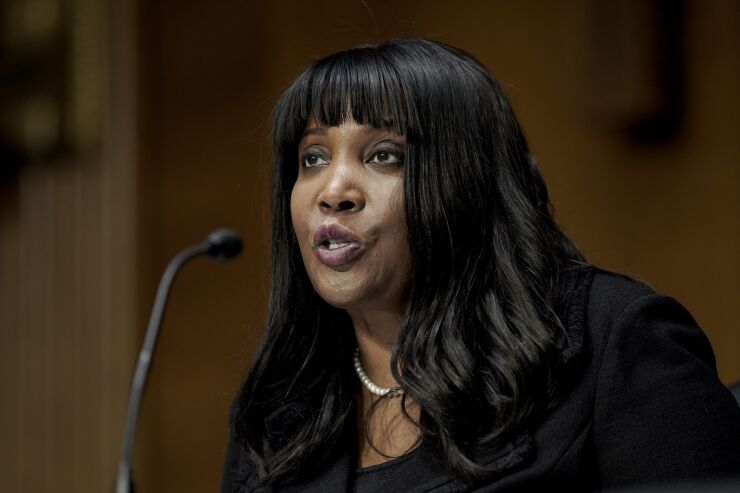WASHINGTON — Lisa D. Cook became the first Black woman to receive Senate confirmation for a seat on the Federal Reserve Board Tuesday night, capping an arduous nomination process beset by Republican accusations that she was not qualified to serve.
Cook, who taught economics at Michigan State University before being tapped by the Biden administration for the Federal Reserve, secured confirmation despite uniform opposition from Senate Republicans. A tiebreaking vote was cast by Vice President Kamala Harris, making the vote 51-50 in favor of her candidacy.
Sen. Sherrod Brown, D-Ohio, the chair of the Senate Banking Committee, applauded the vote as “historic.”

“She will bring an invaluable perspective while implementing the Federal Reserve’s dual mandate and protecting its independence,” Brown said in a statement. “Dr. Cook understands how economic policy affects all Americans. She knows that workers drive our economic growth, and she understands that when everyone participates in our economy, it grows faster and stronger.”
Cook’s confirmation is the second the Biden administration has managed to secure out of its slate of four Federal Reserve nominees. Vice Chair Lael Brainard was confirmed by the Senate in April, while Fed Chair pro tempore Jerome Powell still awaits Senate confirmation to lead the central bank. Philip Jefferson, an economist and administration at Davidson College, also awaits Senate confirmation to become a Fed governor.
In a statement released by the White House on Wednesday morning, President Biden thanked the Senate for confirming Cook and urged the chamber to vote on Powell and Jefferson “without delay.”
“While I will never interfere with the Fed’s independence,” Biden said, “I believe we have built a strong economy and a strong labor market, and I agree with what Chairman Powell said last week that the number one threat to that strength … is inflation.”
Cook, who served on the White House Council of Economic Advisers during the Obama administration, is known for academic work on the impacts of racism on the American economy and carried the endorsement of former Fed Chair Ben Bernanke, who was appointed under the Bush administration in 2006.
Republicans in the Senate mounted a considerable campaign against many of the Biden administration’s Fed nominees, particularly against Cook and Sarah Bloom Raskin, Biden’s erstwhile pick to serve as the Fed’s vice chair of supervision. Raskin’s views on the role of climate risk in financial regulation
Cook, meanwhile, was accused by Republicans of being “unqualified” to weigh in on inflation as the Federal Reserve battles 40-year highs and weighs substantial interest rate increases over the coming months.
Sen. Pat Toomey, R-Pa., and the ranking member on the Senate Banking Committee, acknowledged in a statement Tuesday that Cook had “impressive” credentials as a scholar but maintained she was “grossly unqualified to serve on the Fed.”
Cook was also targeted by the American Accountability Foundation, a nonprofit group that has sought to undercut several other Biden administration nominees before they can receive Senate confirmation. The New Yorker
Progressive advocacy organizations cheered Cook’s confirmation on Tuesday night and Wednesday morning. Jesse Van Tol, CEO of the National Community Reinvestment Coalition, said that the economist’s confirmation was "historic and essential. She is extensively qualified and is now the first Black woman to serve on the Federal Reserve Board, bringing both expertise and personal perspective that the board has never had.”





